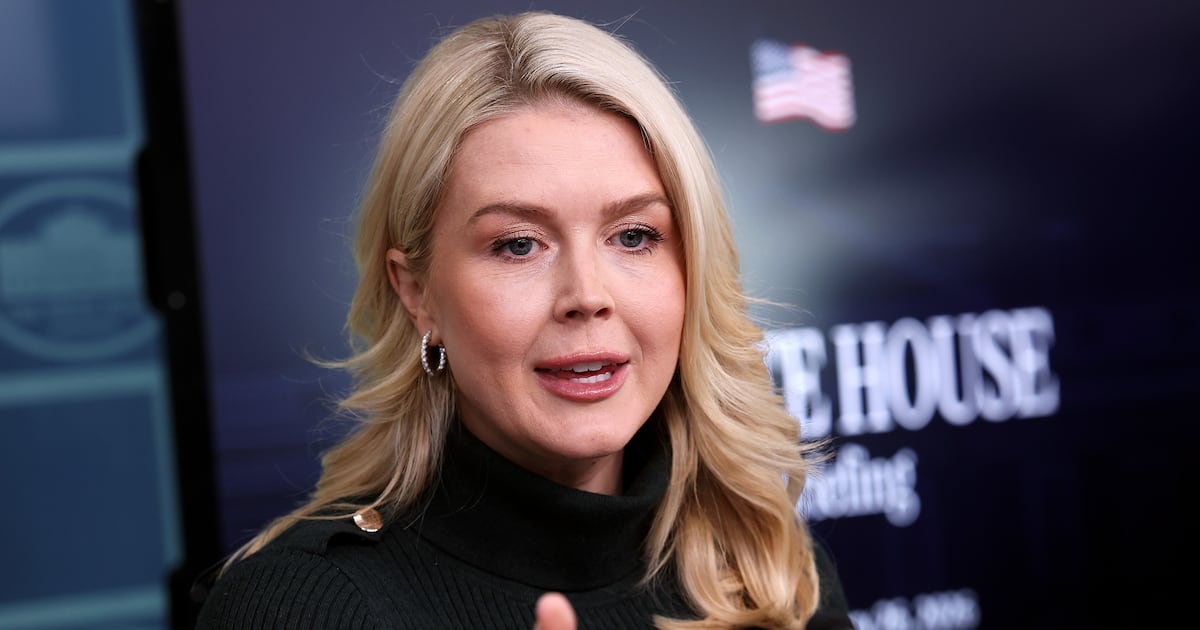The billionaire basketball mogul and breathtaking bigot Donald Sterling managed to rescue the deadbeat racist Cliven Bundy from the media’s center ring.

After his militia-like standoff with federal authorities attempting to collect back bills, the Nevada rancher’s 15 minutes were already dwindling. Enter Adam Nagourney, The New York Times’ longtime political chieftain turned chronicler of the West, from fault lines in California to the renaissance of the Vietnam-blighted but domestically transformative legacy of Lyndon Johnson. Nagourney was the only reporter to show up for a Bundy daily press briefing where the rancher offered up a pean to slavery, reinforced by the basest stereotypes about African Americans. Republicans such as Rand Paul and Ted Cruz pulled back from Bundy if not from his peculiar version of nullification—his fevered attempt to disclaim the validity of federal law. It was predictable; sometimes loyalty to the Tea Party asks too much. But the episode raised, or should have raised, another question: As senators, didn’t these guys take an oath to “defend the Constitution against all enemies, foreign or domestic”?
The press could have spent news cycle after news cycle focusing on the tendency of too many Republicans to fellow-travel with extremists such as Bundy if Sterling hadn’t burst into the headlines. Here was the owner of the NBA’s Los Angeles Clippers, on the phone to his girlfriend, dribbling out foul-mouthed bile insulting to his own players and the legendary Magic Johnson. As long as Sterling was the team’s owner, Johnson soon said, he would never attend another Clippers game.
Well, that didn’t take long: The NBA fined Sterling—although the maximum permitted under the rules, $2.5 million, is a rounding error for him—and banned him from the league not for a year, but for life. Commissioner Adam Silver pledged to “do everything in my power” to force Sterling to sell the team—with which he can now have no contact. Thus we will be spared the endless court-side spectacle of a latter-day purveyor of prejudice presiding over his own private plantation.
Indeed Sterling’s fitness to own a franchise in the NBA, where the players are predominantly African-American, should have been forfeit since 2006, when he forked over $2.7 million—the largest settlement of its kind in history—in a federal suit alleging discrimination across his vast swath of rental apartments. “Black tenants,” he had said, “smell and attract vermin.”
The first black president called out Sterling’s latest screed for what it was—“incredibly offensive, racist ignorance.” The Clippers themselves played on, but protested with pre-game reverse jerseys and black socks, armbands, and wristbands.
The story will now fade—except for the details of Sterling’s acquiescence or resistance as the Clippers are finally sheared away from him. And Bundy, too, will be just an empty 10-gallon hat if and when he’s ultimately held to account. He will be just another right-wing crank who despises federal beneficence except if it’s lavished on him, a “welfare queen of the purple sage brush,” in Paul Krugman’s brilliantly apposite phrase. Bundy’s “crude racism” let Cruz, Paul, and Fox News flee a lawbreaker they never should have embraced in the first place.
That embrace is a symptom of a more fundamental evil older than America itself, and as new as Sterling, Bundy, and the Tea Party types inveighing about “taking our country back.” From whom—minorities, liberated women, and an African-American president, so often the subject of hate-filled caricature at their rallies? As Obama himself explained, the challenge here reaches beyond a Sterling or a Bundy: “The United States still wrestles with the legacy of race and slavery and segregation. I think we just have to remain hopeful that there has been a shift in how we view ourselves.”
But hope isn’t necessarily reality, and a new chapter of genuine equality and mutual respect demands a new politics, especially from the Republican Party. Richard Nixon pursued a “Southern Strategy,” persistently protracted over half a century, that has harnessed white resentment about civil rights as a lever of electoral gain. Todd Purdum describes the result in his riveting landmark saga of the passage of the 1964 Civil Rights Act: “Over the decades, Republican dominance of the South [has] continued.” The title of Purdum’s book is An Idea Whose Time Has Come. And with that idea has come a time when you can mostly, almost automatically, know across much of an entire region whether a voter is Republican simply by seeing if his or her skin is white.
That corrodes the character of the country, and it increasingly poisons Republican prospects in presidential contests as demography inexorably moves us toward an America where minorities are the emerging majority. Soon after abandoning Cliven Bundy, Rand Paul said: “You go to a Republican event and it’s all white people. I tell people that the Republican Party has to look like the rest of America to have a chance.”
But while Paul may broaden his rhetoric, his outreach is cramped. He has opposed the Violence Against Women Act, abortion rights even in cases of rape and incest, citizenship for children born here whose parents are undocumented immigrants, and protections for voting rights. He explained: “There doesn’t seem to be any sort of systemic problem like there was in the South with precluding blacks from voting.” And of course, on gay rights, his libertarianism is conveniently inconsistent: He’s against letting same-sex couples marry. He also voted against the Employment Non-Discrimination Act. What a way to bring African Americans, Hispanics, Asians, women, and LGBT and young voters to the GOP.
Paul is not the exception but a paradigm in a Republican Party that has doubled down on the Southern Strategy—and expanded it to other hot-button issues beyond race. The 2012 GOP campaigns were awash with proposals to outlaw certain forms of birth control, with claims of “legitimate rape,” with anti-immigrant calls to “self-deport,” and with concerted voter suppression schemes. Earlier, in 2004, the Bush re-election effort conspicuously rode the rails of anti-gay prejudice to drive voter turnout. Ken Mehlman, then the Bush campaign manager, has since become a powerful advocate for same-sex marriage and has said he’s “sorry” that “opposing equal rights is [now] a net negative that gets more problematic to voters each year.” But that’s exactly what the GOP continues to do in state party platforms such as Maine’s, where gay marriage is already the law, and that’s what primary voters in 2016 are likely to demand of their presidential aspirants.
Finally, there is a less blatant but equally insidious assault on equal rights from a Supreme Court dominated by Republican appointees. Because one of them, Justice Anthony Kennedy, has strayed on gay rights, the court overturned the Defense of Marriage Act, but it also has cut the heart out of the Voting Rights Act, which a young lawyer named John Roberts crusaded against at the Justice Department in the early 1980s. Ronald Reagan spurned his advice. Now as chief justice, Robert has voted to uphold a Michigan ban on affirmative action in state universities while continuing to permit set-asides for legacy admissions, or in-state students, or athletes.
In 2007, Roberts wrote: “The way to stop discrimination on the basis of race is to stop discriminating on the basis of race.” To put it charitably, this is the jurisprudence of the simpleton. It ignores LBJ’s profound insight that “You do not wipe away the scars of centuries [simply] by saying ‘Now you are free.’ You do not take a person who for years has been hobbled by chains and liberate him, bring him up to the starting line of the race and then say, ‘You are free to compete with all the others,’ and still justly believe that you have been completely fair.”
Cliven Bundy and Donald Sterling have inflicted their own wounds on the American ideal. Bye-bye, Donald—and soon, bye-bye, Cliven. They are both repellant manifestations of things entrenched too long in our political culture, the willful manipulations of the Southern Strategy, and ideologically driven injustice and indifference from the rightward side of the judiciary. When will the time come to say goodbye to all that? It would be good for America. It would be good for the GOP.
It would be good, morally and politically, for the party of Lincoln to honor him at last and hear and heed “the better angels of our nature.”






